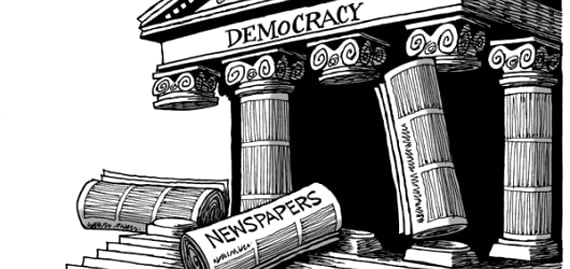 In two days time – on June 17 – it will be exactly 33 years since the Watergate break-in that forced US President Richard Nixon from office after an investigation that has been described as the greatest achievement of modern journalism.
In two days time – on June 17 – it will be exactly 33 years since the Watergate break-in that forced US President Richard Nixon from office after an investigation that has been described as the greatest achievement of modern journalism.
That “third-rate burglary” made few waves at first. In fact, Nixon was re-elected by a landslide a few months later, and it was entirely feasible that government obstruction would have succeeded in putting a lid on the whole story.
But that didn’t happen – thanks to the secret help of an official nicknamed Deep Throat (after an infamous 1970s porn film). This anonymous source encouraged Washington Post reporters Bob Woodward and Carl Bernstein to pursue the story, which led to Senate hearings and finally to the resignation of the president.
We now know that the source was Mark Felt, former deputy director of the FBI. Until he revealed himself last month, Felt was the most famous anonymous person in America. But his reliability was also legendary. Former Post editor Ben Bradlee told the Public Broadcasting Corporation recently that of the 400 Watergate stories he published, only one panned out badly.
In the early 1970s Tough Call was studying journalism at the University of Miami, enjoying the tail end of the counterculture revolution. Despite all the hoo-ha about Watergate, it was the Vietnam War that occupied the minds of most American college students at the time. They faced the draft after graduation – a fate many considered worse than death.
But Watergate was nevertheless a watershed in American history: “1972 was a time when no one could imagine a president of the United States breaking the law,” as one forty-ish commentator recently put it. “We were trusting and believed what we read and heard back then.”
Well, that comment certainly didn’t apply to the students that Tough Call hung out with back then. Watergate only confirmed our general cynicism and mistrust of the political system. But hopefully it has made it more difficult for such naivete to exist in the world’s leading democracy.
According to Simon Wickens, a senior Canadian editor who has worked in both the US and the Bahamas, Watergate was “one of the high points of modern journalism, setting a benchmark and creating self-respect for practitioners of a profession too long stereotyped as shallow, sensationalist scribblers out to sell newspapers and their own grandmothers if need be.”
Watergate inspired a generation of reporters. As one young American put it recently: “I wanted to become a journalist and expose the truth. I wanted to know people like Deep Throat who risked so much in order to do the right thing.”
But although Deep Throat provided much-needed validation to the Post’s editors, Seattle Times columnist Floyd McKay pointed out that Watergate was “relentless shoe-leather reporting. Door by door, night after night, Woodward and Bernstein looked for people with some knowledge of the affair who would be willing to talk.
“Because their results lacked graphic detail and were often based on anonymous sources, the scandal failed to attract television coverage and did not impact the 1972 re-election campaign of President Richard M. Nixon.”
Perhaps, after all these years, a little background is in order. The divisive environment that spawned Watergate was created by the anti-Vietnam war movement – the first time that American leadership and military action had been seriously challenged on a wide scale.
In 1971 the New York Times began publishing the Pentagon Papers – a secret government history of the war that contrasted sharply with public presentations. So White House agents were sent to burglarize a psychiatrist’s office to find files to discredit Daniel Ellsberg, the former defence analyst who leaked the documents.
A year later five men were arrested trying to bug Democratic Party offices in the Watergate hotel and office complex in Washington DC. One of them (James McCord) worked for Nixon’s re-election committee and was connected to a former CIA agent linked to the White House (Howard Hunt).
According to the Washington Post, “By October, 1972 the FBI had established that the Watergate bugging incident stemmed from a massive campaign of political spying and sabotage conducted on behalf of President Nixon’s re-election and directed by officials of the White House and the Committee for the Re-election of the President.”
But that did not stop the Nixon administration from covering up its involvement and dismissing the Post story as “not only fiction, but a collection of absurdities.”
The burglars were convicted in January, 1973 – well after the election. But soon the president’s closest aides were forced to quit as the scandal grew. They were advisors John Erlichman and Bob Haldeman, and attorney-general Richard Kleindienst. White House lawyer John Dean was fired by Nixon at the same time and ended up as a star witness in the Senate hearings.
In June, 1973 Dean told the Senate that Nixon knew of, and helped plan, the Watergate cover-up. And soon it became known that Nixon had been taping his conversations in the White House for posterity. This led to a furious battle over “executive privilege”, which the Senate eventually won (with the help of the Supreme Court).
Then, in October, 1973, Nixon ordered the dismissal of Archibald Cox, the independent prosecutor he had appointed to investigate Watergate only a few months earlier. Both the attorney-general and his deputy refused the order on grounds of principle, and were fired themselves. These events became known as “the Saturday Night Massacre”.
Solicitor-general Robert Bork became acting attorney-general and proceeded to carry out Nixon’s bidding. (Bork’s appointment to the Supreme Court by Ronald Reagan in 1987 was blocked by the Senate, mainly as a result of lingering hostility over this obsequious act).
The administration then ordered the FBI to seal the offices of the dismissed attorney-general and special prosecutor. According to Cox, this amounted to a subversion of the rule of law: “Whether ours shall continue to be a government of laws and not of men is now for Congress and ultimately the American people,” he said at the time.
In July, 1974 Nixon was forced to turn over the White House tapes to Congress. Despite his protestations that “there can be no whitewash at the White House”, the recordings showed he had, in fact, tried to divert the investigation. Shortly afterward Congress passed the first of three articles of impeachment, charging obstruction of justice.
Seeing the writing on the wall, on August 8, 1974 Nixon became the first American president to resign office. Vice President Gerald Ford replaced him, and a few months later pardoned Nixon of all charges related to Watergate.
Although Ford said that by accepting the pardon the former president was admitting his guilt, Nixon went on to become an elder statesman while many of his top aides and cabinet ministers served prison terms for their roles. Nixon died in 1994.
What was Watergate? It was about hiding the identities and wrongdoing of employees of the Nixon reelection committees and White House aides “who had undertaken to destroy the integrity of the process by which the president of the United States is nominated and elected.” Senator Sam Ervin said at the time.
The Watergate investigation was brought to a fitting close in 2003, when the University of Texas (the largest university in the US) bought Woodward and Bernstein’s Watergate archives for $5 million. Who would have thought that a collection of reporters’ notes could fetch so much money.
Interestingly, Watergate had some parallels with the “nation for sale” drug trafficking scandal in the Bahamas during the 1980s, when NBC television broke the news that government officials were on the payroll of Colombian drug lords.
Just like Nixon, the late Sir Lynden Pindling, who was prime minister at the time, angrily protested his innocence. And just like US attorney-general John Mitchelll, our attorney-general, Paul Adderley, tried to put the blame on a massive anti-government conspiracy.
But as the international media pursued the story, the political fallout was dramatic. Sir Lynden’s closest ally – deputy prime minister Arthur Hanna – resigned over the way the crisis was being handled. And cabinet ministers Perry Christie and Hubert Ingraham were fired for urging a more aggressive approach to the corruption charges.
It may be difficult to recall those days when the Bahamas was known as a crook’s paradise, ruining our reputation and spawning social problems that still bedevil us today. But the facts are there – a 500-page commission of inquiry report in 1984 linked a number of high-ranking officials and politicians to foreign gangsters and outlined the consequences.
Unlike Nixon, Sir Lynden went on to win the 1987 general election. But it was his last. Like Jimmy Carter in 1976, Hubert Ingraham came to office in 1992 as a reformer, with a mandate to address official corruption as well as political and economic decline.
What was the role of our press and civil society during this national crisis? Unfortunately – and for a variety of reasons – most of the telling information was provided by the American media. One wonders what would have happened if it had all been up to us.
Sounds like a subject for another time.
What do you think?
The views expressed are those of the author, and not necessarily those of the Nassau Institute (which has no corporate view), or its Advisers or Directors.
This article was first published in The Tribune on Wednesday, June 15, 2005.
The column ‘Tough Call’ by Larry Smith is published in The Tribune every Wednesday and is reprinted here as a courtesy. Mr. Smith founded and successfully grew an advertising agency over 20 years. Under his direction Media Enterprises diversified into short-run commercial printing and publishing, and is now the largest non-fiction book wholesaler in the Bahamas. He has 30 years experience as a journalist and publicist and has contributed numerous articles and columns to the Bahamian press. A former reporter at the Nassau Guardian, local correspondent for Reuters and editor at the Bahamas News Bureau, he conceived and edited the Bahama Almanac (published 2000 by Media Enterprises), wrote the commentary for Mike Toogood’s Portrait of an Archipelago (published 2004 by Macmillan Caribbean), and edited the Bahamas Environmental Handbook (published 2002 by the government). In 2003 he took a year’s leave of absence from Media Enterprises to lead a transition management team at the Nassau Guardian after the paper was acquired by local investors. After leaving the Guardian he was contracted by the Tribune as online manager/editor and columnist. He has a degree in political science and journalism from the University of Miami.


